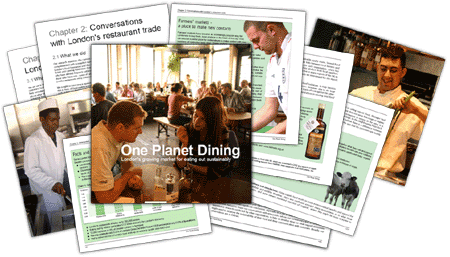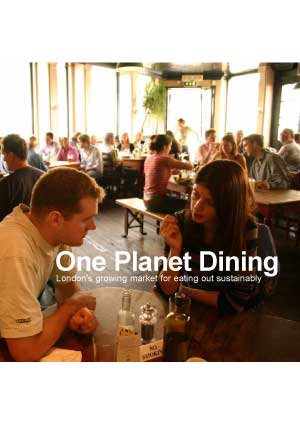One Planet Dining: London's growing market for eating out sustainably
 This London Food Link report (2007) provides insights into the practices and attitudes around food sustainability in the restaurant, hotel and catering sectors in London, and early initiatives to support improvements.
This London Food Link report (2007) provides insights into the practices and attitudes around food sustainability in the restaurant, hotel and catering sectors in London, and early initiatives to support improvements.
This 124-page report is part of a programme of work by London Food Link to improve the sustainability of London's food system, in support of the Mayor of London's ground-breaking London Food Strategy, published in 2006. The research and activities that gave rise to this report were funded by the Environmental Action Fund (EAF) of the Department for Environment, Food and Rural Affairs (Defra) as part of a wider initiative to promote sustainable consumption. London Food Link's work on this and related themes was also supported by the European Regional Development Fund (ERDF).
For this report, we set out to investigate the potential for greater use of sustainable food, and greater uptake of sustainable business practices by London's food service sector. We interviewed 27 people who run restaurants, hotels or catering operations in London. Of these, we chose seven restaurants to interview in more depth - those that are already improving the sustainability of their food and business practices. To help us understand the market for sustainable food in the capital, we also reviewed national market research literature and undertook restaurant customer interviews in four areas of London.
Further, we informed our analysis by interviews with seven people and organisations whose work has an important influence on food choices when eating out - the suppliers, regulators, catering training organisations and media professionals who service and report on London's restaurant trade.
As a result, our report provides a picture of current practices and attitudes to sustainability within the restaurant, hotel and catering sectors in London, and initial work to support improvements. The report also seeks to identify the best ways to stimulate a more sustainable food system for the capital, and the people and organisations best placed to make this come about. A companion report has also been published by London Food Link, called Recipe for a Greener Curry, looking at the potential for the adoption of sustainable products and practices by London's multi-cultural food businesses.
Since this report, Sustain has worked to implement its recommendations, or to support their implementation by others. This work has informed the launch of Sustain's Ethical Eats initiative, promoting healthy and sustainable food with restaurants and caterers, which works in partnership with the new Sustainable Restaurant Association. The insights also helped inform establishment of Sustain's Food Legacy campaign which aims to help more caterers and food suppliers achieve the ambitions of the London 2012 Food Vision, and the launch of Sustain's successful Sustainable Fish City campaign.
Summary and recommendations
Chapter 1: Introduction
- Ethics and eating out
- Understanding sustainability and the restaurant sector
- Looking to the future
- Defining sustainable food systems
- A note of caution
Chapter 2: Conversations with London's restaurant trade
- What we did
- Sustainability pioneers
- Local and seasonal food
- A growing interest in healthy food
- Fish: a subject of special concern
- Using organic food
- Using local and regional suppliers
- A question of scale
- The value of certification and brands
- Communicating sustainability to customers
- Is there a need for a sustainable logo or green restaurant association?
Chapter 3: Conversations with London's restaurant customers
- What we did
-
What we found
- Customers buy sustainable produce in the supermarket
- Customers sometimes think about sustainability when choosing a restaurant
- Customers do not mention sustainability to the restaurant staff
- Many restaurants do not give information about food provenance
- People put their trust in the restaurant owner
Chapter 4: Conversations with seven food specialists
- Academy of Culinary Arts - Sara-Jayne Stanes
- Asian and Oriental School of Catering, Hoxton - Damien Nolan
- Chartered Institute of Environmental Health - Sharon Smith
- Chiltern Farm Foods meat and game supplier - Keith Bennett
- Department of Hospitality, Leisure and Tourism Management, Oxford Brookes University - Donald Sloan
- Little Scarlet fruit and vegetable supplier - Bill Mollett
- Sauce Communications - Amy Williams
Chapter 5: Initiatives supporting sustainable restaurants and catering
- Examples from the UK
- Examples from the United States of America
- Examples of national and international awards
- Examples of logos and accreditation schemes
- Waste management services and advice
- Training opportunities
Case studies: Seven restaurants serving up sustainability
- Acorn House - Arthur Potts Dawson
- Moshi Moshi - Caroline Bennett
- Duke of Cambridge - Geetie Singh
- Pod Foods - Kate Skerritt
- Konstam - Oliver Rowe
- Blueprint Café - Jeremy Lee
- Leon - Henry Dimbleby
Appendices
- Appendix 1: Guidance notes used for restaurant interviews
- Appendix 2: Guidance notes used for customer interviews
- Appendix 3: Contact details of restaurants and caterers interviewed

One Planet Dining: London's growing market for eating out sustainably
ISBN: 978-1-903060-43-8 124pp - 2007 | 3194Kb
Published Monday 30 April 2007
London Food Link: London Food Link brings together community food enterprises and projects that are working to make good food accessible to everyone in London to help create a healthy, sustainable and ethical food system for all.